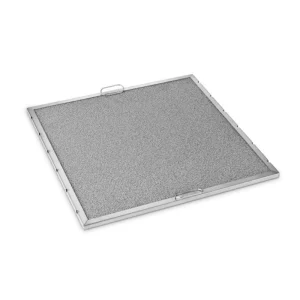5 Days a week from 8:30 am to 5:30 pm
How to Choose the Right Kitchen Hood Filter for Your Needs?


A kitchen hood filter keeps your kitchen fresh and safe. It catches grease and smells. This guide looks at different filter kinds and care tips. It helps you pick one that fits how you cook. You’ll learn how SIMPLE offers trusty products, like their special grease filter, to improve your kitchen’s air.
What Are the Different Types of Kitchen Hood Filters?
Kitchen hood filters come in various styles. Each works best for certain needs. Knowing their features helps you choose wisely.
Characteristics of Mesh Filters
Mesh filters are often made of light metal or strong steel. They use layers of netting to grab grease from cooking steam. These are common in home kitchens. They’re cheap and can be used again. The filters are easy to carry and clean. You can put them in a dishwasher. But they may get blocked fast with lots of grease. So, they need cleaning often. SIMPLE’s steel grease filter is a tough mesh choice for homes and businesses.
Features of Baffle Filters
Baffle filters are usually strong steel. They have curved pieces that guide air and catch grease well. These are great for cooking a lot. They handle heavy grease without clogging quickly. The filters are solid and can go in the dishwasher. They need cleaning less often than mesh ones. Their shape helps air move better. This makes them popular for busy kitchens or eager home cooks. SIMPLE’s baffle filters work well in tough settings.
Benefits of Charcoal Filters
Charcoal filters are used in hoods that don’t vent outside. They’re great at removing bad smells and smoke. Made of special carbon, they soak up tiny bits from cooking vapors. They send clean air back into the room. These are perfect for apartments or kitchens without outdoor vents. But you can’t reuse charcoal filters. You must replace them every few months. They don’t catch grease well. Often, they’re used with other filters for full cleaning.
|
Filter Type |
Material |
Reusability |
Grease Capture |
Odor Removal |
Best For |
|
Mesh |
Light metal, Steel |
Yes |
Okay |
Low |
Home kitchens, light cooking |
|
Baffle |
Steel |
Yes |
Great |
Low |
Heavy cooking, businesses |
|
Charcoal |
Carbon |
No |
Low |
Great |
No-vent hoods, smell control |
How Do You Determine the Right Filter for Your Cooking Style?
Picking a filter depends on how you cook and your kitchen’s air system. The right filter matches your habits. This keeps it working well.
Considering Cooking Frequency and Intensity
If you cook every day or use hot methods like frying, baffle filters are good. They handle lots of grease. You clean them less often. For people who cook sometimes, mesh filters are enough. They’re not pricey and easy to care for. Charcoal filters work for cooking with little grease, like steaming, in no-vent systems. Think about how much and how hard you cook. This helps you choose a filter that’s easy to keep up.
The Role of Cuisine Type in Filter Selection
The food you make affects grease and smells. Cooking with lots of oil, like stir-fries, makes more grease. Baffle filters are best for this. Lighter foods, like steamed dishes, work fine with mesh filters. Foods with strong smells, like spicy dishes, need charcoal filters in no-vent hoods. SIMPLE’s special grease filter is great for oily cooking. It catches grease well for many food types.
Matching Filters with Ventilation Requirements
Hoods that send air outside need filters that catch grease, like mesh or baffle. Hoods that keep air inside need charcoal filters to clean smells. These often pair with grease filters. Look at your hood’s guide to check what fits. SIMPLE’s filters work with many hood styles. They ensure good air flow. Measure your hood’s filter space to make sure it fits tightly.
What Maintenance Does a Kitchen Hood Filter Require?
Regular care keeps filters working right. It stops grease from building up. This prevents fires. Cleaning and replacing depend on the filter type.
Cleaning Methods for Various Filter Types
Mesh and baffle filters can be used again. They’re safe for dishwashers. If washing by hand, soak them in hot water with soap or baking soda for 15 minutes. Scrub softly with a brush to get rid of grease. Rinse well and let them dry in the air. Then put them back. Don’t use strong cleaners like bleach. These can hurt the metal. Charcoal filters can’t be cleaned. You need to replace them when they’re full. SIMPLE’s steel filters are SIMPLE to clean. They stay effective with little work.
Replacement Guidelines for Optimal Performance
Mesh and baffle filters don’t need replacing often. They last unless they’re broken. Check for dents or rust every six months. Charcoal filters need replacing every few months. It depends on how much you cook. If smells stay or air moves slowly, they’re full. For busy kitchens, check charcoal filters every month. SIMPLE gives clear advice with their grease filters. This helps you replace them on time for steady performance.
Why Is Material Important When Selecting a Kitchen Hood Filter?
The material of a filter changes how long it lasts and how well it works. It also affects care needs. Picking the right material ensures good results over time.
Common Materials Used in Kitchen Hood Filters
Light metal is easy to carry and cheap. It’s used in mesh filters. But it can rust, so clean it gently. Strong steel is tough and resists rust. It’s in mesh and baffle filters. It’s great for heavy cooking, like in SIMPLE’s steel grease filter. Special carbon is in charcoal filters. It’s awesome for catching smells but can’t be reused. Some filters use a soft material that you throw away. These are for kitchens that don’t cook much.
Durability and Efficiency Factors to Consider
Strong steel lasts the longest. It stays good even in busy kitchens. It costs more but keeps working longer than light metal. Light metal can bend or rust. Charcoal filters are thrown away, so they’re not lasting. How well a filter works depends on what you need. Baffle filters catch grease best. Charcoal filters are great for smells. SIMPLE’s filters mix long life and good work. Their steel options keep going strong.
|
Material |
Durability |
Efficiency |
Maintenance |
Cost |
|
Light Metal |
Okay |
Okay (Grease) |
Dishwasher-safe |
Low |
|
Strong Steel |
Great |
Great (Grease) |
Dishwasher-safe |
Medium-High |
|
Special Carbon |
Low (Throw-away) |
Great (Odor) |
Replace every 3-6m |
Medium |
|
Soft Material |
Low (Throw-away) |
Okay (Grease) |
Replace when full |
Low |

How Can SIMPLE Help Meet Your Kitchen Hood Filter Needs?
SIMPLE, a trusted supplier, focuses on top-quality kitchen hood filters for homes and businesses. They’re known for new ideas and happy customers. SIMPLE offers products that fit different cooking needs.
Overview of SIMPLE as a Trusted Supplier
SIMPLE Kitchenware has worked hard to make lasting, useful kitchen items. Their filters follow strict safety rules. This keeps air clean and stops fires. They sell to people all over the world. SIMPLE uses smart tech and practical designs. This makes them a favorite for kitchen air solutions.
Key Features of SIMPLE’s Kitchen Hood Filters
SIMPLE’s filters catch almost all grease bits, making kitchens cleaner. Their steel products last a long time without rusting. You can clean them in a dishwasher easily. They fit many hood sizes and types, from homes to big kitchens. These features make SIMPLE’s filters stand out.
Customer Support and After-Sales Services from SIMPLE
SIMPLE gives fast help through email and phone. Their website has guides, size tips, and care advice. They offer warranties for up to a year to fix problems. You can get longer warranties too. SIMPLE’s focus on helping customers ensures your kitchen hood filter works great.
Conclusion: Making an Informed Choice for Your Kitchen Hood Filter Needs
Choosing the right kitchen hood filter depends on how you cook and your air system. Mesh filters are good for light cooking. Baffle filters handle lots of grease. Charcoal filters work in no-vent systems. Picking a material, like strong steel, helps it last. Cleaning or replacing filters regularly keeps air clean and safe. SIMPLE offers dependable, easy-care filters for a fresher, safer kitchen.
FAQs About Kitchen Hood Filters
What Is the Lifespan of a Typical Kitchen Hood Filter?
Mesh and baffle filters can last many years with good care. They often work for 5-10 years unless broken. Charcoal filters last a few months, depending on cooking. Cleaning reusable filters helps them last longer. Replacing charcoal filters on time keeps them working. SIMPLE’s steel filters are built to last a long time.
Can I Replace My Kitchen Hood Filter Myself?
Yes, most filters are easy to swap. Pull or unlock the old filter from under the hood. Then slide in a new one. Make sure it fits tightly. Check your hood’s guide for specific steps. SIMPLE’s filters, like their special model, come with easy instructions for quick changes.
How Often Should I Clean or Replace My Kitchen Hood Filter?
Clean mesh and baffle filters every month or two for normal cooking. Clean them weekly if you cook greasy foods a lot. Replace charcoal filters every few months. If smells stay, replace them sooner. Busy kitchens should check filters often. SIMPLE suggests monthly checks to keep air flowing well and safe.

